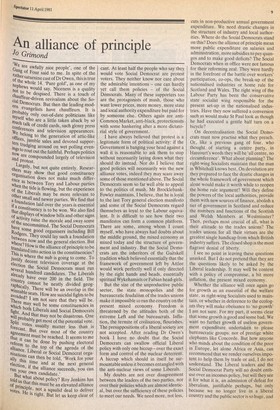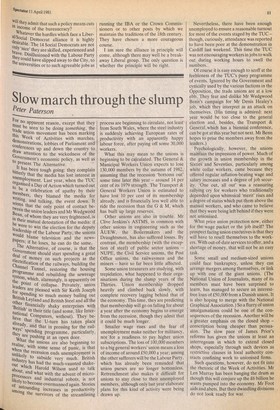An alliance of principle
Grimond
'We are awfully nice people', one of the Gang of Four said to me. In spite of the rather saturnine cast of Dr Owen, this is true of the whole 14. 'Pure gold', as one of my nephews would say. Niceness is a quality not to be despised. There is a touch of Chauffeur d' revivalism about the Social Democrats. But then the leading modern evangelists have chauffeurs. It is Probably only out-of-date politicians like myself who are a little taken aback by so much talk of credit cards, such glossy press conferences and television appearances; We belong to the generation of attic-like Offices, jumble sales and devoted supporters trudging around on wet polling evenings to rout out the faithful. Perhaps politics noW are compounded largely of television and protest. Largely, but not quite entirely. Researchers may show that good constituency organisation does not make much difference as between Tory and Labour parties When the tide is flowing, but the experience of the Liberals may be more relevant to Other small and newer parties. We find that a foundation laid over the years is essential if a constituency is to be won. We also find that displays of window bills and other signs of activity raise the morale and sway some Of the uncommitted. The Social Democrats have some good organisers including Bill Rodgers. They could lay such a foundation between now and the general election. But Where? How is the alliance of principle to be translated into action in the constituencies? This is where the nub is going to come. To Justify decent television coverage at the election the Social Democrats must run several hundred candidates. The Liberals already have over 200 in the field. The country cannot be neatly divided geographically. There will be an overlap in the Winnable seats. How are suicidal fights to be avoided? I am not sure that they will be. There may well be some constituencies in Which both Liberals and Social Democrats fight. And that may not be disastrous. One will probably get most of the potential vote. Split votes usually matter less than is forecast. But over most of the country agreement must be reached. It seems to me that it can be done by pushing electoral reform to the top of the agenda of the alliance. Liberal or Social Democrat organisations can then be told, 'Work for your ally this time and at the next general election, if the alliance succeeds, you can run your own candidate.' %It what about policy? Roy Jenkins has told us that this must be an elevated alliance of principle, not a squalid deal to deliver votes. He is right. But let us keep clear of cant. At least half the people who say they would vote Social Democrat are protest voters. They neither know nor care about the admirable intentions — one can hardly yet call them policies — of the Social Democrats. Many of these supporters too are the protagonists of mush, those who want lower prices, more money, more state and local authority expenditure but paid for by someone else. Others again are antiCommon Market, anti-black, protectionists with some hankering after a more dictatorial style of government.
I have always believed that protest is a legitimate form of political activity: if the Government is banging your head against a wall it is reasonable to ask them to stop without necessarily laying down what they should do instead. Nor do I believe that good policies will necessarily win the new alliance votes, indeed they may scare away some of those mentioned above. The Social Democrats seem so far well able to appeal to the politics of mush. Mr BrocklebankFowler maintains, I believe, that he is loyal to the last Tory general election manifesto and some of the Social Democrats regard themselves as loyal to the Labour equivalent. It is difficult to see how their two manifestos can form a common platform. There are some, among whom I count myself, who have always had doubts about the middle ground, the mixed economy as mixed today and the structure of government and industry. But the Social Democrats are the inheritors of the Gaitskell tradition which believed essentially that the framework of government left by Attlee would work perfectly well if only directed by the right hands and heads, essentially spiritual Wykehamists or Fabian head-girls. But the size of the unproductive public sector, the state monopolies and the bureaucratic feudalism of the trades unions make it impossible to run the country on the present mixed economy. Freedom is threatened by the attitudes both of the extreme Left and the bureaucrats. Inflation, the termite of civilisation, flourishes. The presuppositions of a liberal society are not accepted. After reading Dr Owen's book I have no doubt that the Social Democrats can swallow official Liberal policy with only one hiccup — over the exact form and control of the nuclear deterrent. A hiccup which should in itself be surmountable unless it becomes entangled with the anti-nuclear views of some Liberals.
My doubts are not over disagreement between the leaders of the two parties, nor over their policies which are almost identical, but over the sufficiency of these policies to meet our needs. We need more, not less, cuts in non-productive annual government expenditure. We need drastic changes in the structure of industry and local author ities. Where do the Social Democrats stand on this? Does the alliance of principle mean more public expenditure on salaries and administration, more subsidies to pay quangos and to make good deficits? The Social Democrats when in office were not famous for their reforming zeal. They were hardly in the forefront of the battle over workers' participation, co-ops, the break-up of the nationalised industries or home rule for Scotland and Wales. The right wing of the Labour Party has been the conservative state socialist wing responsible for the present set-up in the nationalised indus tries. Have they now suffered a conversion such as would make St Paul look as though he had executed a gentle half turn on a bicycle?
On decentralisation the Social Democrats must now practise what they preach.
Or, like a previous gang of four, who thought of starting a centre party, in Harcourt's words they will be 'all centre, no circumference'. What about planning? The right-wing Socialists maintain that the man in Whitehall knows best. On devolution are they prepared to face the drastic changes in the whole framework of government which alone would make it worth while to reopen the home rule argument? Will they define the powers of the local authorities, provide them with new sources of finance, abolish a tier of government in Scotland and reduce the numbers and functions of the Scottish and Welsh Members at Westminster? Then, perhaps most crucial of all, what is their attitude to the trades unions? The trades unions for all their virtues are the greatest single handicap from which British industry suffers. The closed shop is the most flagrant denial of liberty.
I see no point in leaving these questions unasked. But I do not pretend that they are the questions likely to be asked by the Liberal leadership. It may well be content with a policy of compromise, a bit more inflation, the present mixed economy.
Whether the alliance will once again go for growth as an essential of the welfare state, as right-wing Socialists used to maintain, or whether in deference to the ecologists they will make obeisance to 'no growth' am not sure. For my part, it seems clear that some growth is good and some bad. We want no further growth of useless government expenditure undertaken to please bureaucratic groups: nor of prestige white elephants like Concorde. But how anyone who minds about the condition of the poor in Europe, let alone Africa or Asia, can recommend that we render ourselves impotent to help them by trade or aid, I do not understand. The Liberal leaders and the Social Democrat Party will no doubt enthuse over an incomes policy, but will they see it for what it is, an admission of defeat for liberalism, justifiable perhaps, but only because we no longer live in a liberal country and the public sector is so huge, and they admit that such a policy means cuts in income of the bureaucracy? Whatever the hurdles which face a Liberal/Social Democrat alliance it is highly desirable. The 14 Social Democrats are not ,_°111Y 'nice' they are skilled, experienced and brave. Disillusioned with the Labour Party they could have slipped away to the City, to the universities or to such agreeable jobs as running the IBA or the Crown Commissioners or to other posts by which we maintain the traditions of the 18th century. They have chosen a more courageous course.
I am sure the alliance in principle will come, although there may well be a breakaway Liberal group. The only question is whether the principle will be right.











































 Previous page
Previous page